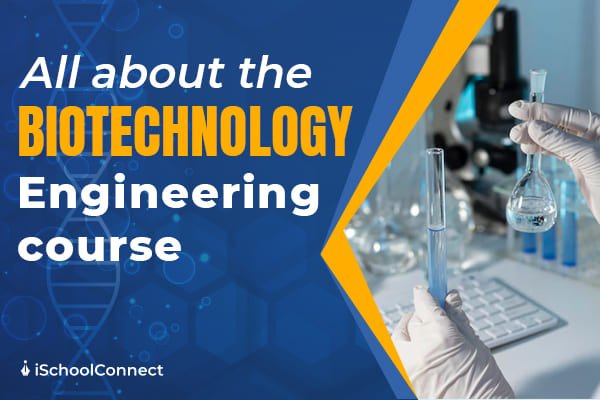Introduction to biotechnology Biotechnology is a multidisciplinary field that harnesses biological processes for practical applications. It can change the way we live and work and address some of the world's most pressing challenges. It has a profound impact on various sectors, from healthcare and agriculture to environmental conservation and industrial processes. In this blog, we will discuss the vast scope of biotechnology, its applications, and the implications of this rapidly evolving ...
Read MoreDid you know that biotechnology is one of the fastest-growing industries, with an expected 7% growth rate for jobs in the U.S. over the next decade? In fact, the U.S. biotechnology sector alone is set to add over 87,600 new job opportunities by 2032. This surge in demand is driving up salaries, with more than 60% of biotechnology professionals earning over $90,000 annually—7% higher than the national average. Graduates from ...
Read MoreLet's explore more about biotechnology courses in the UK. Biotechnology courses in the UK offer a comprehensive education in the field, covering everything from the fundamental principles of biotechnology to advanced research techniques. The course prepares students for careers in a variety of fields, including pharmaceuticals, agriculture, and environmental science. One of the key advantages of studying biotechnology in the UK is the country's strong reputation for academic excellence. UK universities are ...
Read MoreMSc in Biotechnology in the UK Biotechnology students in the UK can discover the science of life, biological organisms, and the improvement of microorganisms. They can be livestock and various creatures, the production of antibiotics, genetic manipulation, and so on. Furthermore, the MSc in Biotechnology in the UK incorporates research in life science, a molecular study of products and services, and more. Keep reading to learn more about biotechnology in the ...
Read MoreWhat is Biotechnology Engineering Course? Biotechnology Engineering courses are degree programs that involve applied sciences in the field of biology, medicines, and engineering, along with other useful applications. The course could be both undergraduate and postgraduate programs whose duration can be of 4 years and 2 years, respectively. A lot of students are considering this field of study to be pursued for long-term careers and become research scientists. Students who have ...
Read MoreStatistics reveal that the global biotechnology market value was estimated at a whopping USD 1.37 trillion in the year 2022. This number is only expected to grow owing to an increase in the demand for futuristic solutions for various concerns in industries, including healthcare. If you are considering becoming a part of this lucrative field, it is crucial that you pursue a recognized biotechnology program. With an industry like biotechnology, which ...
Read MoreFAQs in Biotechnology Interviews Hiring managers at biotech institutions rarely ask subject matter-based questions. Instead, they look for various research-specific acquired skills and behavioral traits in a candidate that make them good employees and an ideal fit in the organization. Here is a list of the top ten FAQs in Biotechnology interviews. FAQs in Biotechnology Interview for Freshers Let’s learn together about biotechnology interview questions and answers. Q1. What sparked your interest in biotechnology, ...
Read MoreBiotechnology jobs | An overview Imagine studying different kinds of organisms and their chemical processes, interesting right?! Now, imagine using these processes to make products that solve the complex problems we're facing. That's biotechnology! Most of us imagine that biotechnologists wear white courts and work in labs or clinics. But these are not the only career options in biotechnology. While some of these careers involve studying human DNA, others are for students ...
Read MoreFrom completely changing the quality of a crop to altering which nutrients we can use in medicines, biotechnology is changing the way our world functions. Using it, we can decide the color of plants, make artificial organs, ferment beer, and even transform our very genes. The varied applications of this field make it super interesting to study. And the subjects you learn can vary from mathematics and engineering to biology, ...
Read MoreCSU Channel Islands | Overview California State University Channel Islands (CSUCI) is a 4-year university located in Camarillo, California. It is the newest of the 23 campuses in the California State University system, started in 2002. The campus is near the Santa Monica Mountains, about halfway between Los Angeles and Santa Barbara. According to the U.S. News & World Report 2025 rankings, it was placed 5th for social mobility, 12th among ...
Read MoreWhether you’re drawn to Austria’s historic cities like Vienna and Salzburg or the high-quality programs offered by its universities, Austria offers a blend of academic excellence and vibrant student life. Let’s explore the best universities in Austria for international students, their standout programs, and why this country might just be the perfect choice for your educational journey in this blog. Unknown Facts About Austria Austria is a country rich in culture, history, ...
Read MoreIn 2024, studying abroad remains a dream come true for many Indian students, with a record-breaking 13,35,878 pursuing education overseas. Popular destinations like Canada, the United States, and the United Kingdom continue to lead the way, but countries like Germany and Poland are quickly gaining attention for their excellent education opportunities. If you're considering studying abroad after 12th for Indian students, this could be your chance to explore diverse cultures, ...
Read More










